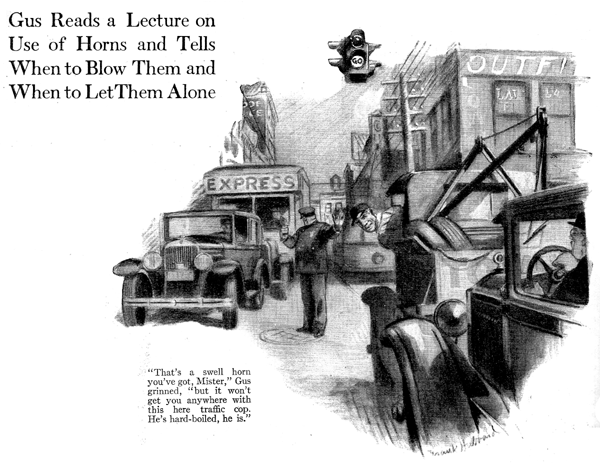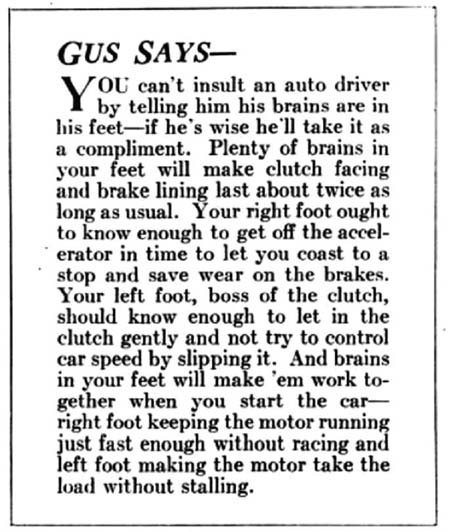May 1930
By Martin Bunn

"This is the third trip this week to get odd-sized tires," Gus Wilson grumbled disgustedly as the red light flashed on at a crossing and he brought the Model Garage service car to a halt.
Joe Clark, his partner in the garage business grinned cheerfully.
"Never mind, old-timer," he said, "it won't be long now before most of the old crocks that use freak sizes go to the junk dealer. It's a good thing not so many sizes are used on the new cars."
Gus merely grunted as he watched for the green light. It flashed on a second or two later, but just as he started to let in the clutch the traffic officer held up his hand to allow another car to make a left turn. The driver in the car behind immediately thumbed his horn button for a series of aggravating toots.
"Must be Honking Harry," Gus snapped to Joe as he stuck his head out to see who was doing the tooting.
"That's a swell horn you've got, mister," he grinned, "but it won't get you anywhere with the traffic cop that's holding up this parade. He's hard-boiled he is."
Gus forgot the incident until a few days later when a car pulled up in front of the Model Garage.
"Bet you Honking Harry's busted his tooter again," Gus whispered to Joe as the owner of the car approached the two garage men.
"How about fixing my horn, Gus?" he asked. "Can you do it now? I feel lost without a horn."
"That's how any motorist ought to feel Mr. Blainfield," Gus agreed, as he lifted the car's hood. "I guess we can take care of you right away."
"A horn is mighty important," observed Blainfield as Gus got out his tool kit and started to take the horn mechanism apart.
"Sure, a horn is important," Gus agreed, "but you don't have to blow it all the time."
"Yeah?" grunted Blainfield. "How else are you going to tell people what to do?"
"That's just the point," said Gus. "A horn isn't to tell people what to do. It's really only a warning signal to let other people know what you are going to do, and to me it's a sign that you are a good driver if you know when not to use a horn as well as when to use it."
"Maybe so," admitted Blainfield, "but it seems to me that it is always better to blow the horn if there's any doubt about it. Then you are on the safe side."
"Not always," Gus maintained. "there's nothing safe about blowing your horn and expecting that the fellow trying to cross the street is going to stop because he hears you tooting. Maybe he won't, and then if you slam him, the knowledge that you blew the horn is kind of cold comfort.
"To my way of thinking a horn is an emergency signal. If you're a good enough driver you'll handle your car so that the occasions when you'll have to blow the horn are few and far between. Just the other day I made a fifty-mile trip and just for fun I counted the number of times I blew my horn. The total was only three. Once was when a fellow started to cut in on me. Another time was when some kids were playing in the street and that time I blew it while I was still quite a way off so as to tell them I was coming. The third time was to warn a fellow who was backing into the space ahead of me that he was coming back too far."
"I never looked at it that way before," said Blainfield. "Don't you blow your horn when you pass cars? What do you do when you come to a crossing?"
"Sometimes I give one quick toot if I have to pass a car and he's too far out on the road," Gus answered, "but I never pass a car at a crossing nor just before a crossing. It's a good idea to give a long toot before you reach a crossing if it's a bad one, but it's a lot safer to slow down so you can stop in time if there is another car coming.
"I don't claim that blowing a horn is always foolish," Gus went on, "but a lot of it certainly doesn't get you anything. The silliest honking is when you get tied up in traffic. The fellow at the head of the line is just as anxious to get on as you are. Blowing your horn doesn't clear the traffic. Of course, there are times when the fellow at the head of the line doesn't notice the green light. One short toot from the car right behind him ought to be enough without the whole line giving an imitation of Armistice Day."
"That's right, too," agreed Blainfield.
"While you're fixing that horn can't you make it sound better?"
"What do you want to make it sound better for?" asked Gus. "An auto horn is a warning signal and a warning signal ought to warn and not play pretty music. Of course there's no sense in having a horn so loud and rough that it scares a man half to death, but we've got to remember that when the difference between hearing the horn and not hearing it may be the difference between life and death, there's no sense in taking a chance on a soft sounding horn."
"There's something in that," admitted Blainfield. "Tell me, Gus, which kind of horn is better, the motor-driven or the buzzer type?"
"Six of one and half a dozen of the other if they're both kept in good condition," said Gus. "Of course, any horn ought to be a quick on the trigger. It ought to start making a loud noise the instant you thumb the button. A fraction of a second delay may be just enough to cause a crash. The buzzer horn starts instantly, though there isn't much difference nowadays, because motor-driven horns are built so that the armature jumps into action real fast."
"Why wouldn't it be a good idea to have two horns?" Then if one broke the other would work," Blainfield suggested.
"There's only one objection to that," Gus replied. "If you had the two horns working from the same button a break in the wiring would put them both out of commission. If you had them work from two different buttons on different wiring, you'd probably forget to press the other button if the first horn didn't work.
Anyhow it sure is bad medicine to drive so you have to depend on the horn to keep you out of trouble"
END
L. Osbone 2019
